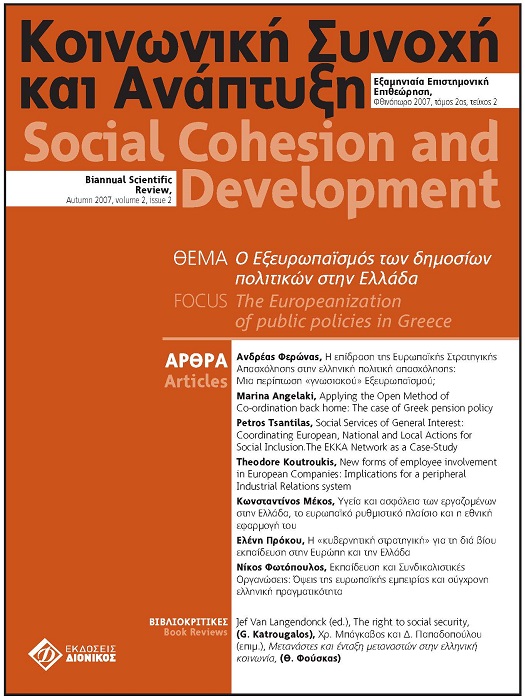Υγεία και ασφάλεια των εργαζομένων στην Ελλάδα, το ευρωπαϊκό ρυθμιστικό πλαίσιο και η εθνική εφαρμογή του
Abstract
Το άρθρο εξετάζει το θεσμικό πλαίσιο που ισχύει για την υγεία και την ασφάλεια των εργαζομένων στην Ελλάδα. Διαπιστώνεται ότι το ρυθμιστικό πλαίσιο για την υγεία και την ασφάλεια των εργαζομένων έχει βασικά ευρωπαϊκή προέλευση, αφού οι εθνικές νομοθεσίες εναρμονίζονται με τις κοινοτικές οδηγίες. Αντιθέτως, οι μηχανισμοί επιβολής της νομοθεσίας δεν συγκλίνουν, αφού η δημόσια διοίκηση της κάθε χώρας εξακολουθεί να χρησιμοποιεί τις δικές της λειτουργίες και διαδικασίες. Η οργανωτική δομή και η ιστορία του κάθε μηχανισμού επιβολής έχουν
μεγάλη σημασία, ενώ η ανεξαρτησία του από την κυβέρνηση είναι απαραίτητη για την αμεροληψία του. Στο άρθρο γίνεται επίσης αναφορά στον Ευρωπαϊκό Κοινωνικό Χάρτη, του οποίου η σημασία φαίνεται να είναι προς το παρόν περιορισμένη.
Article Details
- Zitationsvorschlag
-
Μέκος Κ. Ζ. (2016). Υγεία και ασφάλεια των εργαζομένων στην Ελλάδα, το ευρωπαϊκό ρυθμιστικό πλαίσιο και η εθνική εφαρμογή του. Social Cohesion and Development, 2(2), 165–177. https://doi.org/10.12681/scad.9050
- Rubrik
- Articles

Dieses Werk steht unter der Lizenz Creative Commons Namensnennung - Nicht-kommerziell - Weitergabe unter gleichen Bedingungen 4.0 International.
Authors who publish with this journal agree to the following terms:
- Authors retain copyright and grant the journal right of first publication with the work simultaneously licensed under a Creative Commons Attribution Non-Commercial License that allows others to share the work with an acknowledgement of the work's authorship and initial publication in this journal.
- Authors are able to enter into separate, additional contractual arrangements for the non-exclusive distribution of the journal's published version of the work (e.g. post it to an institutional repository or publish it in a book), with an acknowledgement of its initial publication in this journal.
- Authors are permitted and encouraged to post their work online (preferably in institutional repositories or on their website) prior to and during the submission process, as it can lead to productive exchanges, as well as earlier and greater citation of published work (See The Effect of Open Access).



